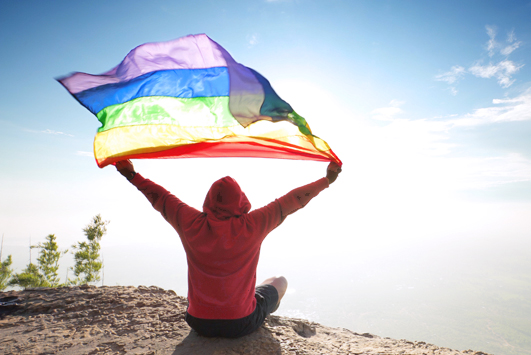Authors: Dr. phil. Ulli Biechele, Dipl.-Psych. Margret Göth, Dipl.-Psych. Thomas Heinrich, Dr. phil. Jochen Kramer and Dipl.-Psych. Andrea Lang
Being LGBTQI* is just as healthy as not being LGBTQI*.
Regardless of whether someone is LGBTQI* or not: therapy or counselling can be helpful in certain situations and for certain burdens.
For example:
- if someone wants to understand themselves better
- if someone wants to develop more self-confidence
- if someone can no longer cope with problems and questions alone
- if someone wants to tackle loneliness
- if someone wants to do something about their fears/anxieties
- if someone wants to stop self-harming
and not only:
- if someone has panic attacks or is no longer able to leave the house alone out of pure fear
- if someone cannot get out of bed for weeks due to depression
- if someone suffers from having to wash their hands fifty times a day
- if someone avoids eating or binge eats and vomits after
- if someone is addicted to alcohol or other substances
in short: if someone wants to change something in their life.
In their studies and training, counsellors and therapists have learned to help in these situations in such a way that those seeking advice can find good solutions for themselves. It is important for LGBTQI* people that they are helped in their counselling or therapy just as much as people who are not LGBTQI*.
This cannot be taken for granted, as their living situation involves its own issues, challenges and opportunities:
- For example, in their teenage years they often do not have anybody to fall happily in love with, who helps them to come to terms with confusing feelings about their own gender and who can understand or help answer questions about their own gender perception. Parents also often burden their LGBTQI* children with their fears of neighbors and other family members.
- Coming out and life as an LGBTQI* person always poses new challenges for adults: Should I come out at work? Why do I not fit in with the scene? How can I have a happy relationship with a partner? How do I become more self-confident? How can I deal with experiences of discrimination and cope with violence that I have experienced by virtue of being LGBTQI*?
- LGBTQI* refugees, for example, ask: How do I come into contact with other LGBTQI* people? Where can I find protection in my accommodation? To whom and in which situations can I come out safely?
The living situation of LGBTQI* people can also have its advantages: for example, if they can break away more easily from classic ways of living that are unsuitable for them and develop new ways of living that are totally personal to them. Good counselling and therapy for LGBTQI* people takes these particular opportunities of LGBTQI* people into account and helps to find suitable answers to LGBTQI*-specific questions.
Last updated: 03/09/2021 - 16:02


